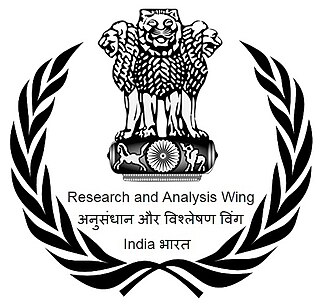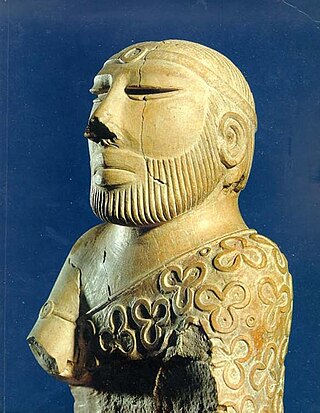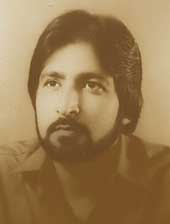Related Research Articles

The Research and Analysis Wing (R&AW) is the foreign intelligence agency of India. The agency's primary function is gathering foreign intelligence, counter-terrorism, counter-proliferation, advising Indian policymakers, and advancing India's foreign strategic interests. It is also involved in the security of India's nuclear programme.

Altaf Hussain is a British Pakistani politician who is known as the founder of the Muttahida Qaumi Movement. He holds United Kingdom citizenship and has been living in exile in the UK since the start of Operation Clean-up. Since 2015, he has been a fugitive from the Anti Terrorism Court of Pakistan on the charges of murder, targeted killing, treason, inciting violence and hate speech. He went on trial in the UK in January 2022 for promoting terrorism and unrest through hate speech in Pakistan, and was acquitted the next month. He had fled the country in 1992 after a crackdown against his party was launched.

D-Company is a name coined by the Indian media for one of Mumbai underworld's organized crime syndicate founded and controlled by Dawood Ibrahim, an Indian crime boss, drug dealer and wanted terrorist. In 2011, Ibrahim, along with his D-Company, was number three on the FBI's "The World's 10 Most Wanted Fugitives" list.
Chhota Shakeel Is an Indian crime boss and a high-ranking leader of the D-Company, a criminal group based in South Asia. He joined the D-Company in 1988 under the kingpin Dawood Ibrahim, and was reportedly responsible for managing the day-to-day operations of the criminal group. Shakeel became one of the most-wanted men in India after his alleged participation in the 1993 Bombay bombings. He is also wanted by the U.S. government for international drug trafficking.

Terrorism in Pakistan, according to the Ministry of Interior, poses a significant threat to the people of Pakistan. The wave of terrorism in Pakistan is believed to have started in 2000. Attacks and fatalities in Pakistan were on a "declining trend" between 2015 and 2019, but has gone back up from 2020-2022, with 971 fatalities in 2022.

India–Pakistan relations are the bilateral ties between the Republic of India and the Islamic Republic of Pakistan. The two countries have a complex and largely hostile relationship that is rooted in a multitude of historical and political events, most notably the partition of British India in August 1947.

This is a timeline of Pakistani history, comprising important legal and territorial changes and political events in the region of modern-day Pakistan. To read about the background of these events, see History of Pakistan and History of the Islamic Republic of Pakistan.
Kashmir Singh is a former Indian spy. He spent 35 years in Pakistani prisons, before he was released with Presidential pardon by Pervez Musharraf.
Harish Salve KC is an Indian senior advocate who practices at the Supreme Court of India. He served as the Solicitor General of India from 1 November 1999 to 3 November 2002. He also fought the case of Kulbhushan Jadhav at the International Court of Justice (ICJ). On 16 January 2020 he was appointed as a King's Counsel for the courts of England and Wales.
Sarabjit Singh Attwal was an Indian national convicted of terrorism and spying by a Pakistani court. He was tried and convicted by the Supreme Court of Pakistan for a series of bomb attacks in Lahore and Faisalabad that killed 14 bystanders in 1990. However, according to India, Sarabjit was a farmer who strayed into Pakistan from his village located on the border, three months after the bombings.
Syed Zaid Zaman Hamid, better known as Zaid Hamid, is a Pakistani far-right, radical Islamist political commentator and conspiracy theorist.

Pakistan is an ethnically and linguistically diverse country. The major Pakistani ethnolinguistic groups include Punjabis, Pashtuns, Sindhis, Gujjar, Saraikis, Muhajirs, Balochs, Paharis and Brahuis, with significant numbers of Baltis, Kashmiris, Chitralis, Shina, Kohistanis, Torwalis, Hazaras, Burusho, Wakhis, Kalash, Siddis, Uzbeks, Nuristanis, Pamiris, Hindkowans, Kyrgyz, Turkmen, Uyghurs and other various minorities.

The Muhajir people are Muslim immigrants of various ethnic groups and regional origins, and their descendants, who migrated from various regions of India after the Partition of India to settle in the newly independent state of Pakistan. The community includes those immigrants' descendants, most of whom are settled in Karachi and other parts of urban Sindh. The Muhajir community also includes stranded Pakistanis in Bangladesh who migrated to Pakistan after 1971 following the secession of East Pakistan in the Bangladesh Liberation War.
Dawood Ibrahim is an Indian mob boss, drug lord, and terrorist from Dongri, Mumbai, who is wanted by the Indian government. He reportedly heads the Indian organised crime syndicate D-Company, which he founded in Mumbai in the 1970s. Ibrahim is wanted on charges including murder, extortion, targeted killing, drug trafficking, and terrorism.
Dr Khaleel Chishty was a Pakistani citizen who was convicted and sentenced to life imprisonment in January 2011 for killing a man after a fight in the Indian town of Ajmer in 1992. The trial lasted 18-years during which time he was kept under house arrest in his ancestral home in Ajmer.
The Inter-Services Intelligence (ISI), intelligence agency of Pakistan has been involved in running military intelligence programs in India, with one of the subsections of its Joint Intelligence Bureau (JIB) department devoted to perform various operations in India. The Joint Signal Intelligence Bureau (JSIB) department has also been involved in providing communications support to Pakistani agents operating in Indian-administered Kashmir. The Joint Intelligence North section of the Joint Counter-Intelligence Bureau (JCIB) wing deals particularly with India. In the 1950s the ISI's Covert Action Division was alleged for supplied arms to insurgents in Northeast India.

Ravindra Kaushik was an Indian Research and Analysis Wing agent who spied for India from 1975 until captured in 1983.
Chaudhary Aslam Khan Swati was a Pakistani police officer. From 2005 to 2014 Aslam arrested and killed terrorists, gangwar-criminals, target killers and extortionists belonging to the Tehrik-i-Taliban Pakistan (TTP), Balochistan Liberation Army (BLA), TMP, Lashkar-e-Jhangvi (LJ), Lashkar-e-Taiba (LeT) and Sipah-e-Sahaba Pakistan (SSP). On 9 January 2014, he was killed in a bomb blast carried out by the TTP.
Kulbhushan Sudhir Jadhav is an Indian national who has been incarcerated in Pakistan since 2016. The Pakistani government alleges that he is a spy for India's intelligence agency, the Research and Analysis Wing and was arrested in the Pakistani province of Balochistan. The Indian foreign ministry says that he was kidnapped from Iran and illegally rendered to Pakistan.
References
- ↑ "Indian community in Pakistan celebrates Diwali". The Times of India . 1 November 2013. Archived from the original on 5 November 2013. Retrieved 25 November 2013.
- ↑ "What it feels like being a Sikh in Pakistan". India Today.
- ↑ Natesan, G.A. (1957). Indian Review, Volume 58. University of California: G.A. Natesan & Co. p. 415.
- ↑ Bagri, Neha Thirani (7 March 2017). "There are more Indian migrants living in Pakistan than the United States". Quartz. Retrieved 6 June 2022.
- ↑ India today, Volume 7. University of Virginia: Thomson Living Media India Ltd. 1982. p. 60.
- ↑ Tohid, Owais; Mahmud, Arshad (29 November 1995). "Homeless In Karachi". Outlook India . Retrieved 8 July 2012.
- ↑ Mahendra, Gaur (2008). Foreign Policy Annual. Gyan Publishing House. pp. 536–537. ISBN 978-8178353425.
- ↑ "Dawood Ibrahim is held in high esteem in Pakistan: Musharraf". NDTV. 16 November 2011. Retrieved 8 July 2012.
- ↑ "Indians told Pakistan 'not safe' for them". Dawn . 27 December 2008. Retrieved 8 July 2012.
- ↑ "Avoid Pakistan travel, India tells citizens". 27 December 2008. Retrieved 8 July 2012.
- ↑ "1,184 Indians in Pak jails, says MEA". Times of India. 5 May 2013. Retrieved 9 November 2014.
- ↑ "The Express Tribune". Watch: Kulbushan Jadhav's confession. 17 July 2019. Retrieved 6 November 2019.
- ↑ "Timeline: How the Kulbhushan Jadhav saga unfolded". Dawn News. 17 July 2019. Retrieved 6 November 2019.
- ↑ "Jadhav admits working for RAW during consular access". The Express Tribune. 2 September 2019. Retrieved 6 November 2019.
- ↑ Web Edition (29 June 2012). "Sarabjit Singh is a terrorist: Surjeet". The News International 2012. Retrieved 2 May 2013.
According to the testament of his fellow spy operatives, Surjeet Singh, confirming that Sarabjit Singh is a terrorist and terrorists are neither released by India nor Pakistan....
- ↑ staff (2 May 2013). "Sarabjit Singh, how a terrorist becomes a hero". Voice of Journalist. Archived from the original on 6 May 2013. Retrieved 2 May 2013.
- ↑ "Sarabjit Singh: Indian 'spy' dies after Pakistan attack". BBC News. 2 May 2013. Retrieved 2 May 2013.